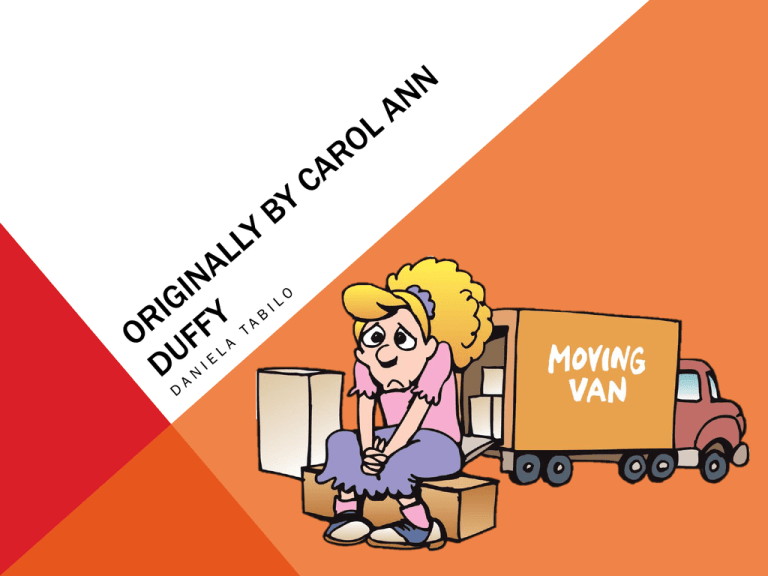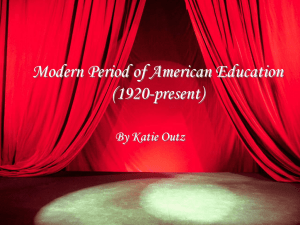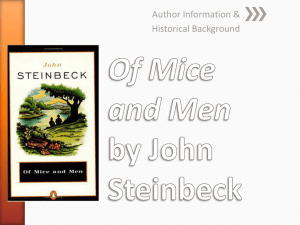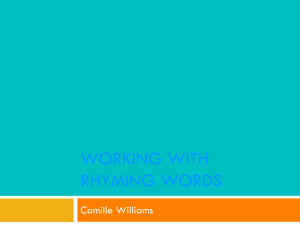Originally by Carol Ann Duffy
advertisement

ORIGINALLY We came from our own country in a red room which fell through the fields, our mother singing our father’s name to the turn of the wheels. My brothers cried, one of them bawling Home, Home, as the miles rushed back to the city, the street, the house, the vacant rooms where we didn’t live any more. I stared at the eyes of a blind toy, holding its paw. All childhood is an emigration. Some are slow leaving you standing, resigned up an avenue where no one you know stays. Others are sudden. Your accent wrong. Corners, which seem familiar leading to unimagined, pebble-dashed estates, big boys eating worms and shouting words you don’t understand. My parents’ anxiety stirred like a loose tooth in my head. I want our own country, I said. 1 4 8 12 16 ORIGINALLY But then you forget, or don’t recall, or change, and, seeing your brother swallow a slug, feel only a skelf of shame. I remember my tongue shedding its skin like a snake, my voice 20 in the classroom sounding just like the rest. Do I only think I lost a river, culture, speech, sense of first space and the right place? Now, Where do you come from? strangers ask. Originally? And I hesitate. 24 FORM Three stanzas Eight lines each – 24 lines total Ten syllables in almost each line Free verse No end rhyme Internal rhymes • Line 15: like a loose tooth/in my head. I want our own country, I said. • Line 22: sense of space/and the right place? • One repetition: • Lines 4-5: My brothers cried, one of them bawling Home/Home, as the miles rushed back to the city • Many enjambment uses (memory) • Use of italics to show speech • • • • • • MARKUP We came from our own country in a red room Markup Key which fell through the fields, our mother singing our father’s name to the turn of the wheels. My brothers cried, one of them bawling Home, Home, as the miles rushed back to the city, the street, the house, the vacant rooms where we didn’t live any more. I stared at the eyes of a blind toy, holding its paw. All childhood is an emigration. Some are slow leaving you standing, resigned up an avenue where no one you know stays. Others are sudden. Your accent wrong. Corners, which seem familiar leading to unimagined, pebble-dashed estates, big boys eating worms and shouting words you don’t understand. My parents’ anxiety stirred like a loose tooth in my head. I want our own country, I said. Simile/metaphor Enumeration Metonymy Imagery Hyperbole Enjambment Miscellaneous Personification MARKUP But then you forget, or don’t recall, or change, and, seeing your brother swallow a slug, feel only a skelf of shame. I remember my tongue shedding its skin like a snake, my voice in the classroom sounding just like the rest. Do I only think I lost a river, culture, speech, sense of first space and the right place? Now, Where do you come from? strangers ask. Originally? And I hesitate. LITERAL MEANING • Autobiographical • Duffy moved from Scotland to England at age 6 • Changed schools multiple times • Grown woman looking back • Can be assumed to be a girl • Reflecting on moving to a new place • Effects of the move on her/himself and her/his family • Addressing people who ask where she/he is from • Nostalgic FIGURATIVE MEANING • Emotional impact on childhood • Scattered childhood memories • Personality changes involved • Culture Shock of a move • Emigration/Immigration during childhood • Family • Where you come from = Home ? • Identity issues when moving • End of childhood ENUMERATION • “as the miles rushed back to the city, the street, the house, the vacant rooms” (Line 5) • “unimagined, pebble-dashed estates, big boys eating worms and shouting words you don’t understand.” (Line 13) • “But then you forget, or don’t recall, or change,” (Line 17) FIGURATIVE LANGUAGE • “We came from our own country in a red room which fell through the fields,”(Line 1) • “I stared at the eyes of a blind toy, holding its paw.” (Line 7) • “All childhood is an emigration.” (Line 9) • “My parents’ anxiety stirred like a loose tooth in my head.” (Line 15) • “I remember my tongue shedding its skin like a snake,” (Line 19) • Recurring: • “big boys eating worms” (Line 13) • “seeing your brother swallow a slug” (Line 18) DICTION • • • • • • • Speech or sound related words: Singing (Line 2) Bawling (Line 3) Accent (Line 12) Shouting (Line 14) Voice (Line 20) Speech (Line 22) • • • • • • • • • Negative words: Cried (Line 4) Vacant (Line 6) Wrong (Line 12) Anxiety (Line 15) Forget (Line 17) Shame (Line 19) Lost (Line 22) Hesitate (Line 24) DISCUSSION QUESTIONS • Is it justifiable to feel guilt after adapting to a place different than one’s home town like the speaker did? • Alike Litany by Carol Ann Duffy, the poem is written from an adult’s point of view who is remembering the past. Do you think this was as effective here as it was in Litany? If not, what would be a better way? • Would the poem’s main ideas be altered if this were written from the brother’s point of view? BIBLIOGRAPHY http://blog.tucsonazrealestate.com/wpcontent/blogs.dir/162/files/2013/07/TucsonAZRealEstate.com_.jpg http://www.existentialpunk.com/.a/6a00d83452358069e20120a5074293970b800wi http://www.carto.net/neumann/travelling/locarno_2005_05_08/13_looking_out.jpg http://www.famousauthors.org/carol-ann-duffy http://www.g08english.com/wp-content/uploads/2013/07/Originally-annotated.pdf http://research-paper-service.blogspot.com/2013/03/originally-carol-ann-duffyanalysis.html http://www.skoleforum.com/stiler/analyse/det.aspx?id=5125 http://www.mightymove.com/wpcontent/uploads/2012/02/MovingcompanyinPlanoTexas.jpg http://graphics8.nytimes.com/images/2013/01/11/us/video-finken/video-finkenarticleLarge.jpg http://1.bp.blogspot.com/-2TUYDCVOsMk/TaAQcVvUNxI/AAAAAAAAAT8/7Kn2k72cVk/s1600/il_570xN.177382426_large.jpg http://www2.hlss.mmu.ac.uk/english/files/2012/10/CAD.jpg








